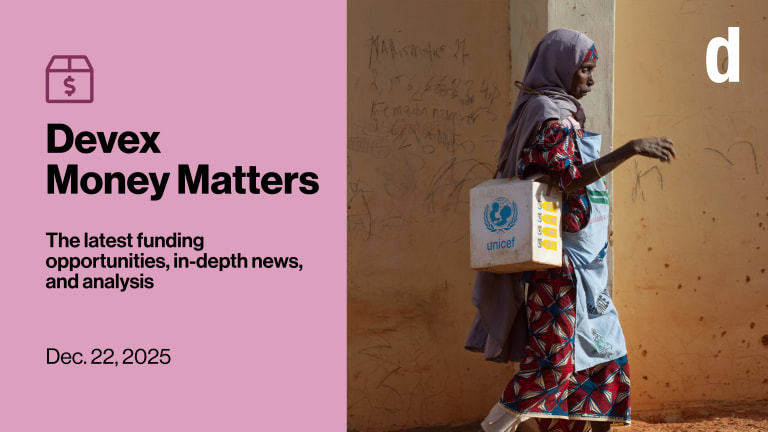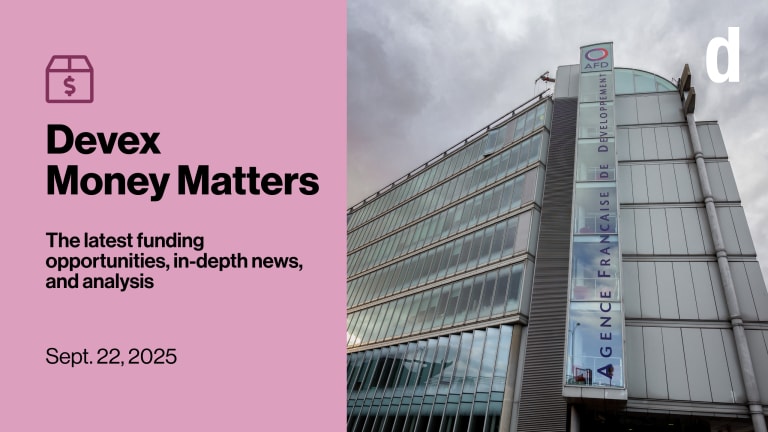
Should eight be your new lucky number?
For the philanthropic group Blood:Water, the answer is a resounding yes. We spoke to the organization’s executive director, Nadia Kist, about why Blood:Water made the choice to fund in eight-year grants.
Also in today’s edition: A look inside Open Philanthropy’s new focus, and an examination of where PEPFAR money will go under the Trump administration’s America First Global Health Strategy.
+ Are there topics you want to read more about in Money Matters? We want your feedback.
A play for patience
Each philanthropy seems to have its own secret sauce for what it believes makes a program successful. Devex dove into that recipe with the head of Blood:Water, a Nashville-based organization that provides eight-year funding commitments to every group it partners with.
The organization focuses on boosting access to HIV prevention, treatment, and safe drinking water, and does so by supporting East and southern Africa-based organizations that are “community-driven and led,” according to Blood:Water’s website.
“Systems change is not quick and fast, it is slow and hard, and requires a commitment that really kind of exceeds a couple of years journeying with an organization,” Kist told Devex during a recent Pro Funding briefing.
The organization also runs the Leader Collective, a digital community of practice that offers coaching, peer-exchange visits, webinars, and self-paced learning to both its own grantees and other African-led organizations.
Read: Why a funder chose to move to 8-year grants (Pro)
+ For more exclusive conversations with nonprofit and philanthropy funders and policymakers, sign up for Devex Pro with a 15-day free trial today and get immediate access to all our exclusive briefings as well as deeper analysis of the development sector like you’ve never seen before. Check out upcoming events lined up for Pro members.
Funding activity
We publish tenders, grants, and other funding announcements on our Funding Platform. Here are some of those viewed the most in the past 10 days.
The Asian Development Bank has approved a $30 million grant to support the provision of quality education in Kiribati.
The Kuwait Fund for Arab Economic Development has signed a $5 million grant agreement to strengthen health systems for the prevention of cholera outbreaks in Sudan.
The World Bank has approved an additional $6 million in funding to enhance social protection initiatives in São Tomé and Príncipe.
The United Nations is seeking a qualified firm to provide training on climate-smart agriculture and post-harvest practices for smallholder farmers in Belize.
The Inter-American Development Bank is inviting consulting firms to support tourism planning through the design of an open innovation program in Brazil.
The Japan International Cooperation Agency is seeking consulting services to support the implementation of an integrated sediment management plan in Morocco.
+ Try out Devex Pro Funding today with a free five-day trial and explore funding opportunities from over 850 funders with the data analysis and industry intelligence you need to win them, in addition to all our exclusive analyses, briefings, and news content.
A new way forward
Speaking of philanthropic giving, we got an inside look into how Open Philanthropy — founded by billionaire couple Dustin Moskovitz and Cari Tuna — is refining its approach.
About a year ago, the philanthropy announced it would begin funding efforts to accelerate economic growth in low- and middle-income countries, marking a departure from its typical grantmaking approach. In years past, Open Philanthropy has funded causes they deem important, neglected, and tractable — but economic growth, my colleague Catherine Cheney writes, is more difficult to measure.
“Still, Open Philanthropy is bringing its ‘hits-based’ giving to this work — accepting that most efforts may fail, but that even one breakthrough could justify the risk many times over,” Catherine writes after interviewing Justin Sandefur, a senior program officer at Open Philanthropy, during a recent Devex Impact House session.
“Expanding into the economic growth arena means stepping beyond proven interventions and randomized control trials — and accepting a different kind of uncertainty, where meaningful progress depends on country leadership and actions beyond any donor’s control,” she adds.
That’s not to say Open Philanthropy is going at it blind: The organization is working with economists engaged in the sector, and focusing on countries that already have political consensus around growth-oriented reform. And still, Sandefur says Open Philanthropy will continue to hold itself to a high bar in terms of the organization’s returns — even with an added layer of risk.
Read: As aid shrinks, top philanthropies test new ways to spur economic growth
What’s next for PEPFAR?
While private funders recalibrate their bets, a far bigger shift is unfolding in U.S. government global health spending.
For years, the U.S. President’s Emergency Plan for AIDS Relief, or PEPFAR, has poured money into HIV/AIDS prevention, treatment, and response programs, especially across the African continent. But in the wake of the State Department’s America First Global Health Strategy, many are still untangling what PEPFAR’s future might hold — and how money might be shifted away from technical assistance, program monitoring, and overall funding for international aid groups.
“It signals an intent to extend — at least temporarily — the administration’s commitment to lifesaving services and to expand support for some additional prevention efforts, including lenacapavir, a six-month injectable that offers near-complete protection against HIV infection,” writes Devex contributor Andrew Green, in his review of what the strategy might mean for PEPFAR.
It’s been a difficult year for the agency — one in which the Trump administration eliminated about 65% of the PEPFAR awards held by the now-defunct U.S. Agency for International Development.
The America First Global Health Strategy paints a more detailed picture for what the Trump administration hopes will emerge in its place: Rather than PEPFAR’s long-standing approach of funding organizations to implement programs, the State Department will finance governments directly, while also leveraging support from the private sector and faith-based organizations.
It’s not a universally popular approach.
“This is not PEPFAR,” says Nina Schwalbe, the CEO and founder at Spark Street Advisors. “It’s something else.”
Read: How will America’s new global health strategy change PEPFAR?
Welcome to Career Week
Devex has three tiers of membership — Career, Pro, and Pro Funding. The first level offers exclusive resources for job seekers, including thousands of roles on our jobs board; the second offers access to our most in-depth and analytical content; and the third offers access to our funding database. Each tier can access the levels of content in the tiers below.
This week is Career Week, where we’ll be putting the emphasis firmly on key resources for those seeking their next role. If you sign up now for an annual Career Account membership, you can access a 50% discount, and you’ll get access to a special report on how key roles have been affected by the aid cuts, which we’ll publish tomorrow, as well as two exclusive events.
All week we'll be bringing you news and events looking at some of the key areas of recruitment in the aid sector, kicking off with a review of how AI is shifting the development recruitment market. Later in the week, we'll have an in-depth report giving information on hiring trends for key job roles, we’ll review the rapidly changing market for jobs in Africa and the U.S., and we'll be looking at how development consultancy has changed as a result of aid cuts.
Read: 4 ways AI is changing the development job market (Career)
+ Don’t yet have the right membership? Start your 15-day free trial of a Career Account annual membership today and get a one-time 50% discount to access all our Career Week offerings!
Cashing in
Even as global health leaders brace for change, another set of players is preparing to capitalize on momentum: cities.
For months, city leaders have been pushing to ensure climate finance makes its way to the municipal level, and that cities — which are often on the front lines of climate change — are not left out of the conversation at Brazil’s upcoming COP30 climate conference.
Late last week, my colleague Jesse Chase-Lubitz exclusively reported that all that hard work had paid off. Jesse got wind that the Baku-to-Belém road map will feature a section on cities, outlining the need for public investment to encourage private investment in the world’s urban hubs.
While the road map is not a legally binding agreement, Jesse wrote, it provides plans for how to stretch $300 billion to $1.3 trillion in the years ahead — and marks the first time that cities have featured so prominently in the process.
Exclusive: Cities stake their claim in COP30 Baku to Belém road map
Money in the bank
Cities aren’t the only ones eyeing capital at scale. Europe’s largest development bank is under scrutiny for how much more it could deploy, with a new analysis finding the European Investment Bank is sitting on €200 billion (more than $230 billion).
That’s according to research from Stephen Paduano, a former U.S. Treasury official and postdoctoral research fellow at Oxford University. Paduano writes that EIB — which is fully owned by European Union member states — could scale up its operations within and beyond the region without losing its AAA credit rating.
“MDBs have the theoretical capacity to lend more, and there’s been a victory lap around that, but are they actually doing it?” Paduano asks.
Paduano’s research shows EIB may be holding back at the same time multilateral development banks are being asked to step up. Still, a spokesperson for the bank tells Jesse that the institution has plans to lend more.
Read: Europe’s biggest development bank is sitting on €200 billion
Sign up to Money Matters for an inside look at the biggest stories in development funding.








